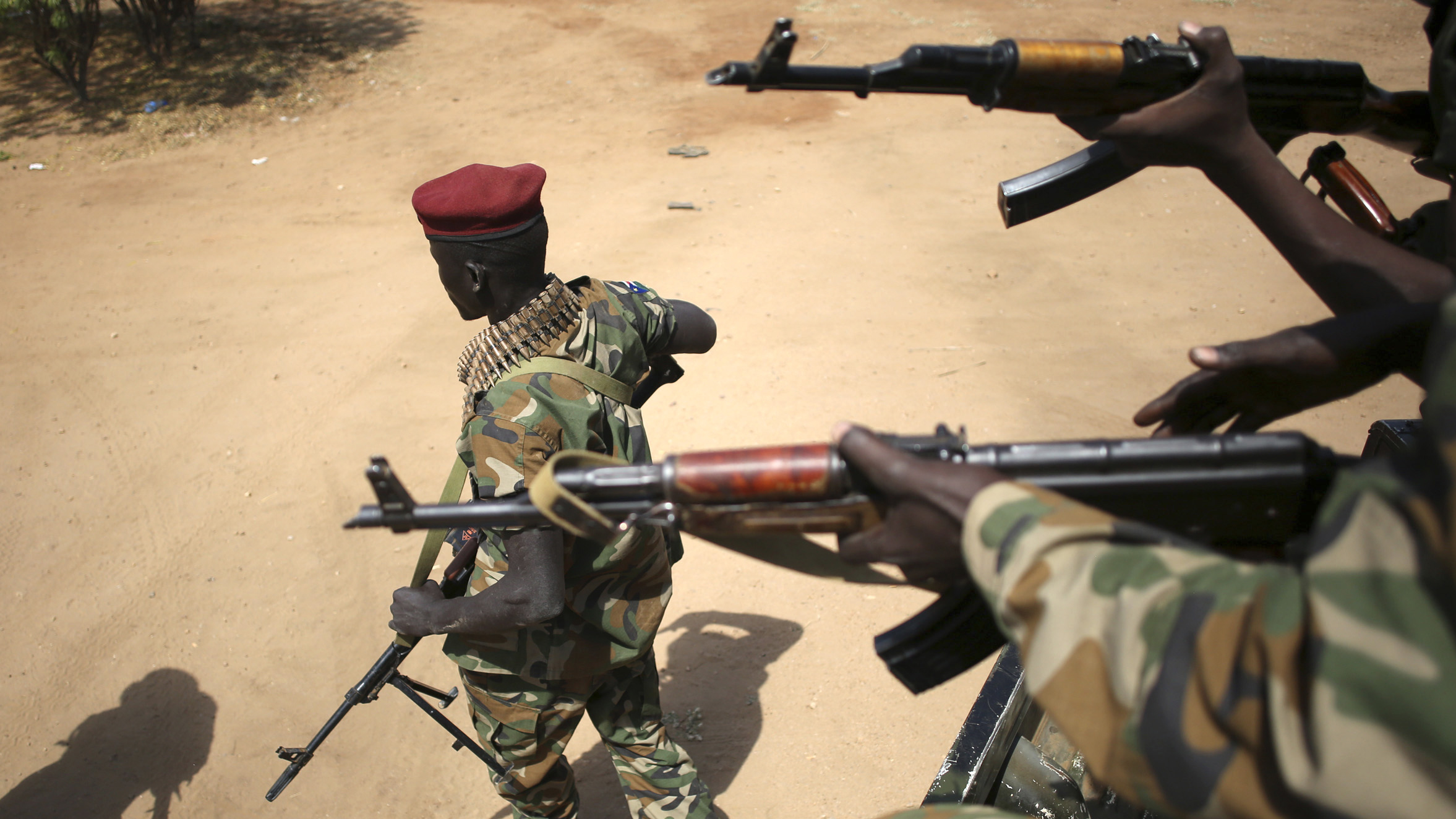South Sudan military ‘recaptures’ key town of Bor
South Sudan’s government says its military have recaptured the key town of Bor, days after it was seized by rebels.
South Sudan’s President Salva Kiir says his forces have recaptured the key town of Bor in what was pitched as a defiant comeback after a week-long battle in the region.
“Forces loyal to the government have taken Bor and (are) now clearing whatever forces that are remaining there,” Mr Kiir reportedly told journalists at his office in Juba. The rebels have not commented on the claim.

It came as UN chief Ban Ki-moon has urged the Security Council to add 5,500 UN troops to the peace-keeping mission in South Sudan, and warned that those responsible for abuse would be held to account.
The mass grave was found in Bentiu, officials said. At least two other mass graves are also reported to have been found in Juba. While UN officials counted 34 bodies, there are 75 people reported missing in total.
The bodies in Bentiu reportedly belonged to the Dinka, who were members of the Sudan People’s Liberation Army, said Ravina Shamdasani, a spokeswoman for the Geneva-based human rights office.
Responding to the discovery, the government minister of information Michael Makuei Lueth said: “Of course Bentiu is under the control of the rebel leader Riek Machar, so we have nothing to do with that area.”
Word of the discovery came as South Sudan undertook military operations to wrest back control of the city of Bor from rebels loyal to the country’s former vice president. Late on Christmas Eve the president Salva Kiir said government troops had regained control of the capital.
Foreign secretary: ‘Extremely concerned’
In a statement released through the Foreign Office on Christmas Eve, William Hague called on South Sudanese leaders “to restrain their supporters and resolve political differences peacefully”.
“The situation in South Sudan is deteriorating. I am extremely concerned by reports of increasing violence along ethnic lines. The targeting of civilians is unacceptable, as are threats against UN peacekeepers trying to protect them.”
He added: “The UK is calling for a Security Council Resolution this afternoon that will ensure the United Nations Mission in South Sudan can swiftly receive the reinforcements it needs. South Sudan was a country born amid hopes of increased peace and prosperity for its people. The gains made over the past two years should not be thrown away.”
Britain has also despatched a senior diplomat to South Sudan to assist efforts in restoring peace, officials said. Sir Simon Gass arrived in the capital of Juba and will work closely with Norwegian and US envoys in a bid to end the violence which is now thought to have resulted in more than 1,000 deaths and 100,000 people being displaced.
More peacekeepers due
Seperately, UN chief Ban Ki-moon has urged the Security Council to add 5,500 UN troops to the peace-keeping mission in South Sudan, and warned that those responsible for abuse would be held to account.
His plea comes as new details emerge of alleged ethnic killings committed during more than a week of violence. Tens of thousands of people have fled fighting, as rebels, thought to support sacked former vice-president Riek Machar, have seized major towns.
I am extremely concerned by reports of increasing violence along ethnic lines. The targeting of civilians is unacceptable, as are threats against UN peacekeepers trying to protect them. Foreign Secretary William Hague
Some British, Canadian and Kenyan citizens are among 3,000 foreigners thought to be trapped in the area with reports that they are undergoing heavy bouts of gun fire.
Australians, Ugandans and Ethiopians are also among 17,000 people seeking protection at a UN base in Bor, a city that could see increased violence in coming days, said Toby Lanzer, the UN’s humanitarian co-ordinator.
Global fears
The UN Secretary-General has urged the Security Council to add 5,500 troops and police to the 7,000-strong UN peacekeeping mission in South Sudan. He cited growing violence in many parts of the country, human rights abuses, “and killings fuelled by ethnic tensions”.
He proposed the troops be transferred from UN missions in Congo, Darfur, Abyei, Ivory Coast and Liberia, along with three attack helicopters, three utility helicopters and a C130 military transport plane.
UN to vote
After an emergency Security Council meeting, France’s UN Ambassador Gerard Araud, the current council president, said the council will vote on a US-drafted resolution authorising the transfers this evening. He said there was “a positive reaction” from all 15 council members.
The secretary-general called on member states urgently to provide transport to get the troops, police and equipment to South Sudan. He said the UN mission’s capacity to investigate human rights abuses is also being urgently strengthened.
Samantha Power, the US ambassador to the UN, said: “The future of South Sudan is in jeopardy. The leaders of South Sudan face a stark choice. They can return to the political dialogue and spirit of co-operation that helped establish South Sudan or they can destroy those hard-fought gains and tear apart their newborn nation.
Ongoing violence
The violence began on December 15. South Sudan President Salva Kiir, an ethnic Dinka, has said an attempted military coup triggered the violence, and the blame was placed on ousted former vice president Riek Machar, an ethnic Nuer. Other officials have since said a fight between Dinka and Nuer presidential guards triggered the fighting.
South Sudan experienced decades of war with Sudan, which it peacefully broke away from in 2011. The US over the last week has evacuated 380 Americans and 300 others from South Sudan, which has seen vicious, ethnically targeted violence spread through the nation.